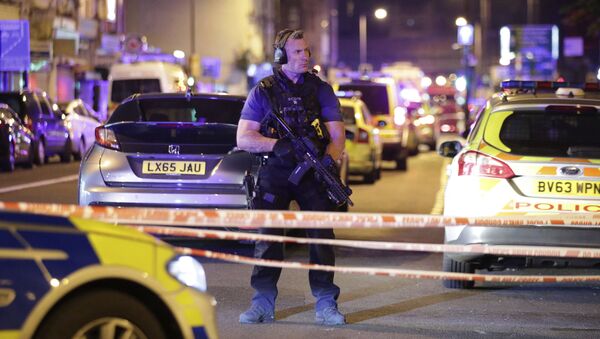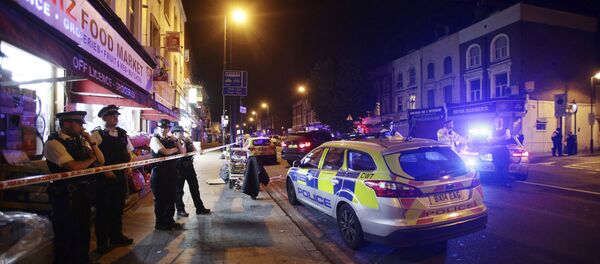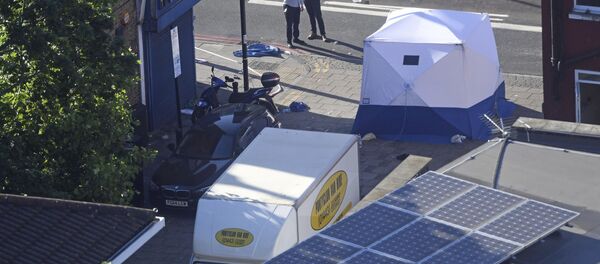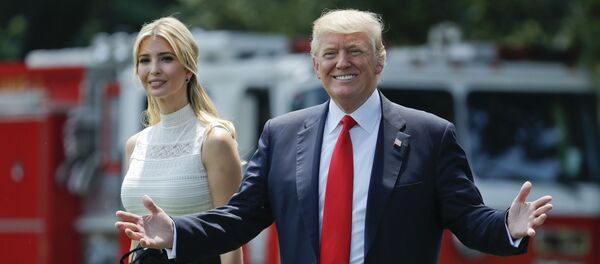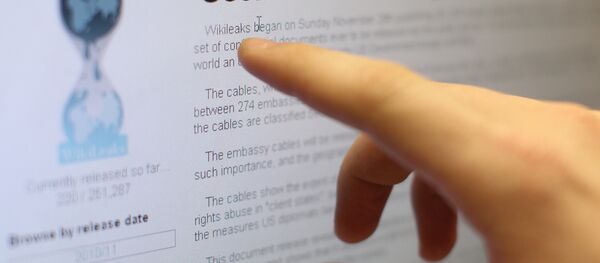EMERGENCY RESPONSE
Metropolitan Police were called soon after 12:20 a.m. (23:20 GMT on Sunday) after the first reports of a van colliding with pedestrians.
Police added that the driver was detained by members the public and then handed over to police officers.
The London Ambulance Service said in a statement that it was called to the scene at 12:15 a.m. and responded to the incident by sending some 60 medics. The ambulance service reported that eight victims of the ramming incident were sent to three London hospitals, while others were treated for minor injuries at the scene.
London's Metropolitan Police said in a statement later on Monday that searches were carried at a residential address in the area of the Welsh capital of Cardiff in relation to the attack. UK Minister of State for Security Ben Wallace noted that the attacker was not known to the UK authorities.
OFFICIAL REACTIONS
Soon after the incident May said in a statement that the attack was of terrorist nature and listed several steps that would be taken following the incident.
The prime minister said that extra resources had been deployed in the wake of the Finsbury Park attack, adding that London would establish a special commission against extremism, including Islamophobia.
The head of the UK government was not the only country's official who condemned the attack.
Mayor of London Sadiq Khan called the incident a "horrific terrorist attack on innocent people."
"The Metropolitan Police are responding to a horrific terrorist attack on innocent people in Finsbury Park… We don't yet know the full details, but this was clearly a deliberate attack on innocent Londoners, many of whom were finishing prayers during the holy month of Ramadan. While this appears to be an attack on a particular community, like the terrible attacks in Manchester, Westminster and London Bridge it is also an assault on all our shared values of tolerance, freedom and respect," Khan wrote on Facebook.
UK Home Secretary Amber Rudd said that the incident could be classified as a suspected terrorist attack and called for citizens to stand together against those who spread hate and fear.
"We must all continue to stand together, resolute, against all those who try to divide us and spread hate and fear," Rudd said, adding that she was in contact with police on the issue.
UK Foreign Secretary Boris Johnson offered his condolences to the victims of the incident, adding that the country would not be divided by hate.
"My condolences to the victims of last night's despicable attack in #FinsburyPark. We will never allow hate to divide us," Johnson said on his Twitter account.
FOREIGN SUPPORT
A number of foreign ministries and officials condemned the attack and wished the victims to get well.
"France decisively condemns the attack that took place… near a mosque in the Finsbury Park area in London… In the face of this new challenge, France assures London residents and UK authorities that it is stands in solidarity with them," the French Foreign Ministry said in the communique.
German government also extended its condolences to the friends and relatives of the victims.
Polish Prime Minister Beata Szydlo said that the attack showed rising levels of hate in the United Kingdom and called people responsible to change the situation. The Polish politician also extended condolences to victims' friends and relatives.
Austrian Foreign Minister Sebastian Kurz and NATO Secretary General Jens Stoltenberg have also condemned the incident on Twitter.
WAYS TO PREVENT RAMMING TERROR ATTACKS
With six ramming attacks carried out globally over the last 12 months, three of them in the United Kingdom, UK experts are trying to find a way to prevent such incidents and preserve security in the country.
"It is impossible to prevent this type of attack. There are too many unprotected targets. We need to focus on preventing radicalization by committing more resources to work with all communities to stop people becoming violent extremists," counter-terrorism expert Bob Milton told Sputnik.
The second area the authorities should focus on is the use of the multi-agencies risk assessment model to determine what level of intervention is required in case of a person's radicalization, Milton noted. Finally, the expert suggested elaborating a "menu of intervention measures" aimed at turning a person away from violent extremism or at least, disrupting his or her plans.
"The reduction in 20,000 police officers has not caused an increase in the attack, but it has meant that we are unable to respond effectively and the police service is stretched to breaking point. The government are right to reexamine the CT Strategy and should focus on countering radicalization," Milton stressed.
John David Taylor, a crossbench member of the upper house of the UK parliament, in turn, suggested the more severe measure to ensure security in the United Kingdom.
"It is regrettable that across the world there is Islamic extremism in every nation where there is a Muslim community … It is important that the UK restricts Muslim immigration into the country as British standards are foreign to them," Taylor told Sputnik.
Taylor also noted that the reduction of the country's police force by some 20,000 officers by the previous government, in which May served as home secretary, was not conductive to counterterrorism.

